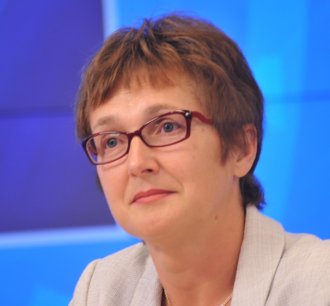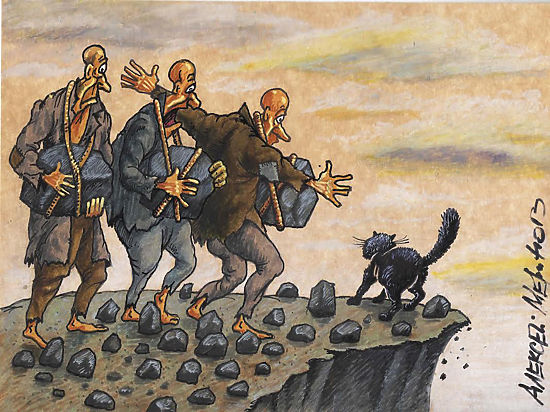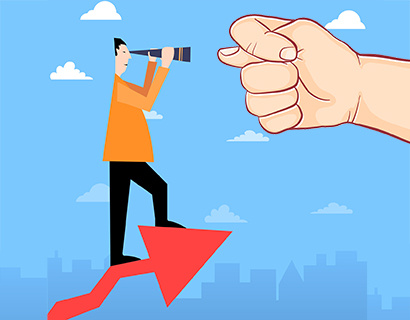
According to a recent study by the Institute for social analysis and prediction Ranepa, for the first time in eight years, the share of expenditure on food in the structure of Russians ‘ consumer spending has exceeded 50%. The country is impoverished, and this is reflected by statistics.
Marina Krasilnikova, head of the research division of consumption and quality of life of the Levada center, told Novaya Gazeta that even in the “fat years” the Russians continued to consume the poor: not being able to invest in education or a decent pension, we bought clothes at expensive stores. Now, according to Krasilnikova, extreme poverty may not be reached, but the course on “decent” poverty — people are not starving, but otherwise depend on the state.

— A year ago the Russians looked to the future with some optimism. Today people finally stopped believing in a speedy exit from the crisis?
— Much optimism there never was, there was some habit that income is continuously growing. Over the past 15 years of economic crises each time were followed by fairly rapid recovery growth. Everything was blamed inflation, called rising prices the biggest problem, but nevertheless always understood that the income will also rise slightly. In this mode we used to exist — no one was ready monthly income losses that occurred during 2015 and is still ongoing. In this sense, it is the last year was for the Russians turning point: it became clear that this time the rapid recovery of will not be. The Russians realized that talking about the crisis do not have at least two years.
So people started to change their consumer behavior and habits. Russian consumers have never built long-term plans: for example, in 2008 one third of the population (36%) talked about the fact that “are usually not making plans for the future”, and nearly as many (33%) did not wish for more than a year or two. Now this horizon has narrowed even more: only one in five plans more than one year in advance. People began to save what was freely bought over the last 10 years. And save not to save, but simply because there is no money. Started cheap range: if earlier people were interested in the quality, the brand, now entrenched orientation for a minimal price. What we saw in the data about the study of consumer behavior over the past year, has become common place and even had a name: the “new reality”. After 15 years of confidence in continuous economic growth has come an understanding that to wait will not work — need to get used to that.
— How much the average Russian consumer had to strike it rich during the years of peak earnings growth?
— Economic growth in the last decade have significantly increased revenues in all segments of the population, but there have been a few structural changes in consumption patterns. The majority of Russians (from 2/3 to 3/4) is still a poor society of people. Not in the sense that they have nothing, but in terms of patterns of consumer spending and expectations. After all, what is a sign of a poor consumer? All income is spent on current expenditure, that is something you can’t refuse, like food. For this people there is no opportunity to generate enough savings to resolve more costly family objectives: housing, education and healthcare.
Rising incomes were spent on current consumption: in food and clothing. There was even “excess” consumption of these articles, when people spent incrementing the income on usual items of expenditure, but had not expanded the range of needs, not diversified consumer spending… Got extra money, bought nice clothes or a tasty meal, thereby approving their social status of a successful person. Another model of conspicuous consumption for the richest mass of the population was foreign holiday, is actually quite inexpensive: Turkey and Egypt. All this refers to the current consumption, and not to the development of human capital. This behavior of the poor. And now, when revenues began to decline, decrease spending on food, clothing, rest. But we cannot say that the people began to starve or that they have nothing to wear.
Actually people left the boutiques with their income and were not supposed to get. And in this sense absolute decline in real income to date was not as socially traumatic as you might expect. Is rejection of those forms of consumption, which have been “redundant” and not so entrenched as the norm. Now this fat almost gone, but what will happen next — I would not undertake to predict.
In other words, the zero years we have gone from absolute poverty, but never moved on to new consumption models?
— Yes, we have won absolute poverty, but not gone from consciousness of the poor. In all that time not yet developed a model of behavior, the idea that it is better to accumulate resources for housing or to give their children education than on the habit of spending all your money on food and clothing. There is poor awareness and a habit to spend on current expenses: housing still never earn, and the social status something to happen. And the status is demonstrated through current consumption only in poor societies. In a more prosperous society he demonstrates, for example, through housing. You can be modestly dressed, to save on clothes is not a shame.
In the Levada center has the scale of subjective evaluation of material status — not in rubles, and on the basis that people can afford. To the beginning of this Millennium, 28% said struggling to get by, and now there is only 3%, and for the last year and a half their numbers have not increased. Easily buy durable goods in the early 2000s was about 4%, two years ago — about 33%, while last year this figure had fallen to 25%. That is, the drop in real monetary income resulted in a decrease in the number of people who feel financially free, but absolute poverty is not increasing.
But in structure of consumption it turns out that poverty is a large part of the country.
— Yes, I mean the poor consumer horizon about 2/3 of Russians are poor. Of course, poverty is always a relative characteristic, even in a poor poor company recognized a minority. Now, according to our estimates, 29% are poor according to subjective assessments. But they talk about the middle class I am always greatly alarmed: they do not explain the behavior of the Russian consumer. Even in zero years it is best explained precisely by the model of poverty. Said: look how much we have expensive shops with people buying clothes. Why buy that instead and then save up to buy a house or spend money on education, they buy clothes that in other societies and patterns of consumption can afford only people much better off. The average representative of the middle class of France or Denmark, and would never spend money to buy a dress from Escada.
— The roots of this “poor consciousness” date back to the Soviet past?
— Yes, in the Soviet Union. The consumer market was there only for food and clothing. Other benefits — housing, health, education — have been received through other channels either for free or through a system of “cronyism”. Consequently, Russian consumers had no skills of solving these problems: the family was not responsible for housing, for health of children — all this was derived outside the cash expenditure of the household, and therefore the corresponding consumer models do not have any. This does not mean that Soviet society was poor — just in terms of market relations consumer behaviour.
— If you try to summarize your prediction on the welfare of Russians, it will look like poverty to us is not yet threatened, but more and more people will fall into the trap of current consumption?
— Embarked on the formation of wide layers of the population living in “decent poverty”. Such people are not starving, but able to provide only their current needs, and in this sense is entirely dependent on the state. The idea of paternalism on this ground very well take root and be cultivated. I really hope that extreme poverty will not come. But the worst thing is that there is no breakthrough beyond the limits of this “dignified poverty” is a very strong constraint on the changes of social consciousness. It deprives people of free choice in consumption and further limits the skills of free behaviour, makes people dependent and passive.








